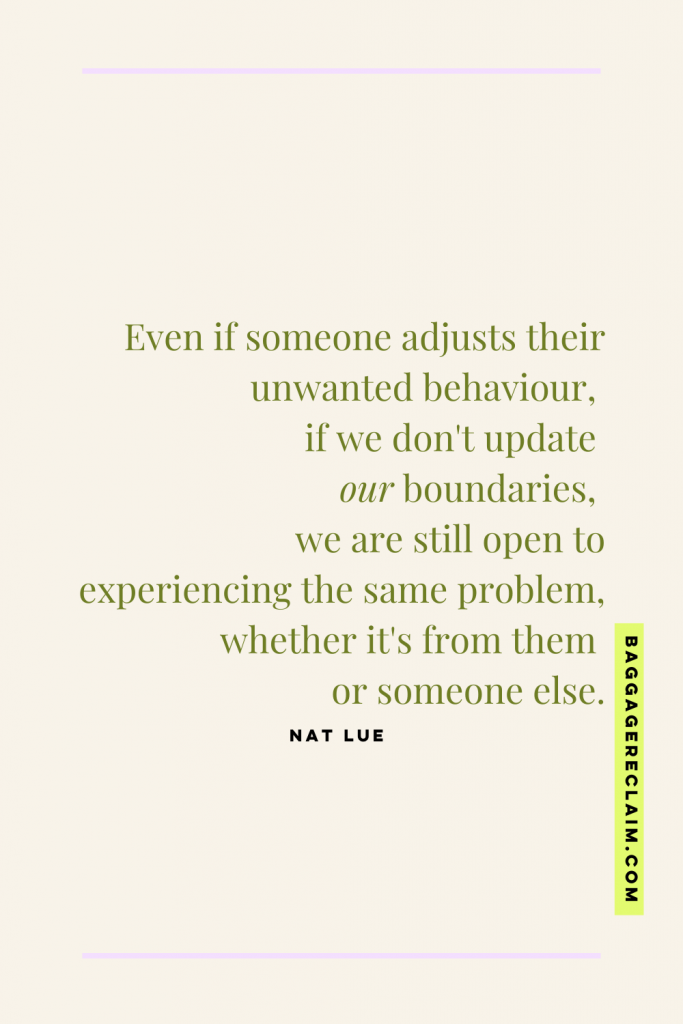A huge source of frustration is knowing that something doesn’t finger good or right for us but waiting for something or someone else to change. This is a purlieus issue that leads to us making choices, plane passive ones, and then feeling wounded by them. This renders us powerless and helpless in the squatter of dealing with unwanted situations. Rather than take whoopee though, we want the other party to change. This way we don’t have to get out of our repletion zone. It’s not necessarily that we think this. Still, there’s this weighing that our discomfort is primarily (or purely) the result of something outside of ourselves.
What we have to realise, though, is that wanting or plane getting someone to transpiration when we have unhealthy boundaries won’t erase our discomfort and make the problem go away.
Boundaries are two-fold. If our thinking and behaviour don’t transpiration in any way, this assumes that the problem is wholly and solely that of the other party.
But if we protract behaving how we did, plane if that person adjusts their behaviour, we are still unshut to the same problem, whether it’s from them or someone else.

If we don’t unclose our part no matter how small, the problem still remains.
E.g. You are a people pleaser who keeps putting your friend’s needs, desires, etc., whilom yours. You alimony willing them plane at the expense of your well-being. Naturally, you sooner finger taken wholesomeness of and unappreciated. Over time, plane though you’ve rescued and people-pleased that person, you now want them to step up. In essence, you want them to transpiration their behaviour to relieve your discomfort.
On some level, there’s this sense that you are only neglecting your needs because of your friend’s mentality and actions. Hence, if your friend sorts themselves out, you won’t have a problem meeting your needs. But that’s magical thinking. Plane if your friend stops doing whatever it is that’s now getting on your nerves, if you’re still using the same thinking and deportment that influenced those choices, the problem in the friendship or in your self-care vein and habits won’t be resolved.
Now, let’s imagine that the friend has an epiphany and realises, Wow, I have really bad boundaries with my loved ones and haven’t been taking responsibility for myself. From now on, I’m going to do my weightier to have increasingly bilateral relationships.
Problem solved, right? Um, no. You, with your pleaser mentality, are going to finger funny when, as a result of your friend having healthier boundaries, you are expected to adjust your ways. You won’t be worldly-wise to try to do things in a way of gaining strokes and praise. Your friend will expect you to speak up. Suddenly you might finger resentful.
The frustrations, challenges and hurts we wits reveal our need for healthier boundaries.
Having poor boundaries isn’t symptomatic of the relationship or situation where we noticed the problem; it’s a habit that once existed. That doesn’t midpoint that what someone else is doing isn’t worrying or problematic, but if we don’t unclose the habits that contribute to us standing with a frustrating situation, we will alimony stuff in repeats of that situation until we do.
Boundaries are two-fold. When we communicate our boundaries to others, we moreover need to communicate them to ourselves.
If we only know or struggle to set other people’s boundaries, this is a sign of poor boundaries. We are trying to rule others with the ill-feeling created by our unhealthy boundaries. If, however, in recognising what it is that we need boundary-wise from our loved ones, we unclose our part in holding up that boundary, then we enjoy increasingly loving relationships and reduce our frustrations.
The post Trying to Make Someone Transpiration Won’t Fix the Problem of Poor Boundaries appeared first on Baggage Reclaim with Natalie Lue.





